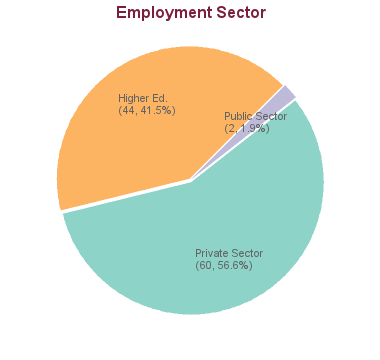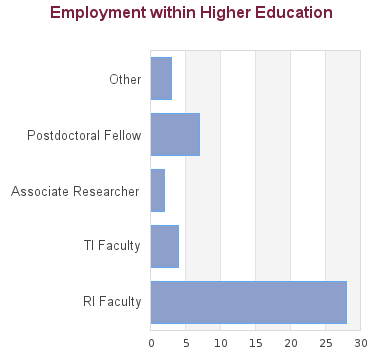
Barry Po
Job Title
Senior Director, Product & Business Development
Employer
NGRAIN

Review details about the recently announced changes to study and work permits that apply to master’s and doctoral degree students. Read more
PhD students in the Department of Computer Science may focus their research in the following areas:
The UBC Department of Computer Science has many contacts in the computing industry. A strong rapport between the industry and research communities is beneficial to both, especially in cases where the department focuses its research to developing real-world applications.
The Faculty of Graduate and Postdoctoral Studies establishes the minimum admission requirements common to all applicants, usually a minimum overall average in the B+ range (76% at UBC). The graduate program that you are applying to may have additional requirements. Please review the specific requirements for applicants with credentials from institutions in:
Each program may set higher academic minimum requirements. Please review the program website carefully to understand the program requirements. Meeting the minimum requirements does not guarantee admission as it is a competitive process.
Applicants from a university outside Canada in which English is not the primary language of instruction must provide results of an English language proficiency examination as part of their application. Tests must have been taken within the last 24 months at the time of submission of your application.
Minimum requirements for the two most common English language proficiency tests to apply to this program are listed below:
Overall score requirement: 100
Reading
22
Writing
21
Speaking
21
Listening
22
Overall score requirement: 7.0
Reading
6.5
Writing
6.5
Speaking
6.5
Listening
6.5
Some programs require additional test scores such as the Graduate Record Examination (GRE) or the Graduate Management Test (GMAT). The requirements for this program are:
The GRE is not required.
All applicants have to submit transcripts from all past post-secondary study. Document submission requirements depend on whether your institution of study is within Canada or outside of Canada.
A minimum of three references are required for application to graduate programs at UBC. References should be requested from individuals who are prepared to provide a report on your academic ability and qualifications.
Many programs require a statement of interest, sometimes called a "statement of intent", "description of research interests" or something similar.
Students in research-based programs usually require a faculty member to function as their thesis supervisor. Please follow the instructions provided by each program whether applicants should contact faculty members.
Permanent Residents of Canada must provide a clear photocopy of both sides of the Permanent Resident card.
All applicants must complete an online application form and pay the application fee to be considered for admission to UBC.
| Fees | Canadian Citizen / Permanent Resident / Refugee / Diplomat | International |
|---|---|---|
| Application Fee | $116.25 | $168.25 |
| Tuition * | ||
| Installments per year | 3 | 3 |
| Tuition per installment | $1,875.34 | $3,294.66 |
| Tuition per year (plus annual increase, usually 2%-5%) | $5,626.02 | $9,883.98 |
| Int. Tuition Award (ITA) per year (if eligible) | $3,200.00 (-) | |
| Other Fees and Costs | ||
| Student Fees (yearly) | $1,144.10 (approx.) | |
| Costs of living | Estimate your costs of living with our interactive tool in order to start developing a financial plan for your graduate studies. | |
Applicants to UBC have access to a variety of funding options, including merit-based (i.e. based on your academic performance) and need-based (i.e. based on your financial situation) opportunities.
All full-time PhD students will be provided with a funding package of at least $33,612 for each of the first four years of their PhD program. The funding package consists of any combination of internal or external awards, teaching-related work, research assistantships, and graduate academic assistantships. This support is contingent on full-time registration as a UBC Graduate student, satisfactory performance in assigned teaching and research assistantship duties, and good standing with satisfactory progress in your academic performance. CS students are expected to apply for fellowships or scholarship to which they are eligible.
All applicants are encouraged to review the awards listing to identify potential opportunities to fund their graduate education. The database lists merit-based scholarships and awards and allows for filtering by various criteria, such as domestic vs. international or degree level.
Many professors are able to provide Research Assistantships (GRA) from their research grants to support full-time graduate students studying under their supervision. The duties constitute part of the student's graduate degree requirements. A Graduate Research Assistantship is considered a form of fellowship for a period of graduate study and is therefore not covered by a collective agreement. Stipends vary widely, and are dependent on the field of study and the type of research grant from which the assistantship is being funded.
Graduate programs may have Teaching Assistantships available for registered full-time graduate students. Full teaching assistantships involve 12 hours work per week in preparation, lecturing, or laboratory instruction although many graduate programs offer partial TA appointments at less than 12 hours per week. Teaching assistantship rates are set by collective bargaining between the University and the Teaching Assistants' Union.
Academic Assistantships are employment opportunities to perform work that is relevant to the university or to an individual faculty member, but not to support the student’s graduate research and thesis. Wages are considered regular earnings and when paid monthly, include vacation pay.
Canadian and US applicants may qualify for governmental loans to finance their studies. Please review eligibility and types of loans.
All students may be able to access private sector or bank loans.
Many foreign governments provide support to their citizens in pursuing education abroad. International applicants should check the various governmental resources in their home country, such as the Department of Education, for available scholarships.
The possibility to pursue work to supplement income may depend on the demands the program has on students. It should be carefully weighed if work leads to prolonged program durations or whether work placements can be meaningfully embedded into a program.
International students enrolled as full-time students with a valid study permit can work on campus for unlimited hours and work off-campus for no more than 24 hours a week during academic sessions.
A good starting point to explore student jobs is the UBC Work Learn program or a Co-Op placement.
Students with taxable income in Canada may be able to claim federal or provincial tax credits.
Canadian residents with RRSP accounts may be able to use the Lifelong Learning Plan (LLP) which allows students to withdraw amounts from their registered retirement savings plan (RRSPs) to finance full-time training or education for themselves or their partner.
Please review Filing taxes in Canada on the student services website for more information.
Applicants have access to the cost estimator to develop a financial plan that takes into account various income sources and expenses.
111 students graduated between 2005 and 2013. Of these, career information was obtained for 106 alumni (based on research conducted between Feb-May 2016):


Our faculty and students actively interact with industry in numerous fields. Via internships, consulting and the launching of new companies, they contribute to the state-of-the-art in environmental monitoring, energy prediction, software, cloud computing, search engines, social networks, advertising, e-commerce, electronic trading, entertainment games, special effects in movies, robotics, bioinformatics, biomedical engineering, and more.
These statistics show data for the Doctor of Philosophy in Computer Science (PhD). Data are separated for each degree program combination. You may view data for other degree options in the respective program profile.
| 2023 | 2022 | 2021 | 2020 | 2019 | |
|---|---|---|---|---|---|
| Applications | 281 | 265 | 375 | 299 | 278 |
| Offers | 31 | 40 | 41 | 45 | 26 |
| New Registrations | 14 | 15 | 20 | 20 | 16 |
| Total Enrolment | 129 | 124 | 116 | 98 | 81 |
Students in research-based programs usually require a faculty member to function as their thesis supervisor. Please follow the instructions provided by each program whether applicants should contact faculty members.
These videos contain some general advice from faculty across UBC on finding and reaching out to a supervisor. They are not program specific.
| Year | Citation |
|---|---|
| 2012 | Dr. Lu developed an accurate and efficient system to automatically track and identify players in broadcast sports videos. This system will greatly reduce the effort of collecting game statistics and enhance a user's viewing experience. |
| 2012 | Dr. Habil Zare discussed important challenges in data analysis that lead to improvements in medicine and biological research. In particular, he applied advanced mathematical theories to enhance lymphoma diagnosis by analyzing flow cytometry using his novel computational techniques. |
| 2012 | Understanding the mechanism of neonates' immune system is crucial, as they are highly susceptible to death caused by infection. Dr. Shooshtari developed mathematical techniques and designed a computational pipeline to efficiently analyze neonatal immune responses to infection. She also derived a formula to measure immune cells functional responses. |
| 2011 | Dr. Hentrich studied biological mechanisms in the cell that encode and process information beyond the DNA sequence. His work illuminates fundamental aspects of cellular functions and describes how certain processes could be used computationally for novel forms of diagnosis on a single-cell level. |
| 2011 | Integrated circuit technology has transformed nearly all aspects of our lives. Dr. Yan used theory from calculus and geometry to develop algorithms that verify that the analog parts of these chips work as intended. He demonstrated his verification methods work efficiently on several practical circuits from industry with promising results. |
| 2011 | Dr. Xu's studies focused on integrating databases from different knowledge domains. He invented advanced techniques to organize databases and enable them to collaborate for queries with optimized complexity. His methods automatically resolve conflicts among query answers, thus reducing human effort and requiring minimal computer resources. |
| 2011 | Dr. Penoff studied the communication aspects of large-scale, parallel computer programs that execute across a cluster of computers constructed from off-the-shelf software and hardware. New communication features were added to existing open source projects, and the features were found to enhance the performance and reliability of previous approaches. |
| 2011 | Dr. Sember studied problems involving points in the geometric plane, where each point's location has some amount of uncertainty, and developed a number of algorithms for generating figures from such points. These figures can provide a more accurate view of certain types of uncertain data. |
| 2011 | Dr. Leung researched ways to help older adults learn to use smartphones and other mobile devices. Specifically, he investigated three novel user-interface-design approaches, showing how each approach can benefit older adults. This work helps researchers and developers design learnable mobile devices for older adults, increasing chances of technology adoption. |
| 2011 | Dr. Golbeck developed techniques for efficient implementation of programming languages that support modern software modularization mechanisms. Such programming languages can be implemented within existing infrastructure and can be as efficient as traditional programming languages. |
Computer Science covers Bayesian statistics and applications, bioinformatics, computational intelligence (computational vision, automated reasoning, multi-agent systems, intelligent interfaces, and machine learning), computer communications, databases, distributed and parallel systems, empirical analysis of algorithms, computer graphics, human-computer interaction, hybrid systems, integrated systems design, networks, network security, networking and multimedia, numerical methods and geometry in computer graphics, operating systems, programming languages, robotics, scientific computation, software engineering, visualization, and theoretical aspects of computer science (computational complexity, computational geometry, analysis of complex graphs, and parallel processing).
Departments/Programs may update graduate degree program details through the Faculty & Staff portal. To update contact details for application inquiries, please use this form.

Find out how Vancouver enhances your graduate student experience—from the beautiful mountains and city landscapes, to the arts and culture scene, we have it all. Study-life balance at its best!